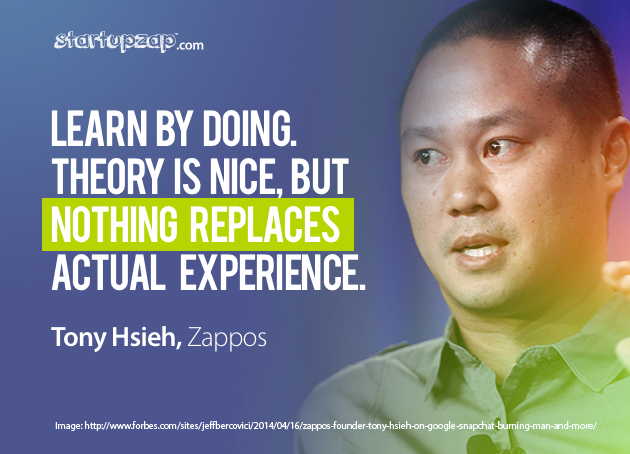Growthsprint is a focused planning period of time during which a team or organisation dedicates…
6 Things Big Business Can Learn From Startups

What’s the key advantage that start-ups consistently hold over big businesses when it comes to innovation?
We take a look at 6 ways startups innovate, and see what they can teach big companies.
1. Agility. Start-ups have to be agile to survive. Since they aren’t sure what will work in the marketplace, they are forced to try various different angles to find the right way to solve problems, market, and sell. Or they die. The same cannot always be said for larger, more established companies who have been executing the same way for years. These companies often struggle to adapt and evolve as they stay with existing processes, are often resistant to changes and inevitably have more rigid decision-making processes.
Looking for support to accelerate your startup, or need assistance with company innovation? Then contact us and we’ll see how we can help.
Start-up agility comes from employee empowerment, a culture where people at all levels of the organisation feel free to think, behave, control, and improve their work autonomously.
How can large organisations take a page out of the start-ups’ book by sparking a cultural transformation from the bottom up, and empowering their employees to make change?
2. Staying Alive. If you are an employee in a large organisation you will know what safety is. Even if you have seen streamlining, redundancies or efficiency drives – this is nothing compared to working in a startup which may not have enough cash to last the next few months, or is relying on a handful of customers.
Startups – their founders and funders – have systematically changed our economy over the past decade.
With the added competition from a growing number start-ups, globalization and other new-market-seeking enterprises, corporates find themselves open to difficulty unless they are open to innovation. Look at the numbers. In 1958 the average lifespan of a S&P 500 company was 60 years, today the average is less than 20.
The only way to survive is to transform into something else – continual transformation. But many large companies are so focused on retaining their core business that they spend no time exploring or experimenting upon other opportunities. Like planning to die, or at least get seriously impacted. Startups do not have this luxury, as most who are still alive after 3 years, will have gone through various pivots and validation points.
Of course innovation is important in the corporate landscape, but the idea that it boils down to culture is a new idea. To date, innovation is often left to a chosen few inside labs or incubators, the so called Skunk Works. A place for a chosen few to innovate. Rather than empowering employees across the business to identify and pursue projects beyond the current business model.
3. Education. Startups are full of bright young things, right? Well, yes most of the time they are led by people who are educated and young, but more often or not, it’s more a case of drive, being inquisitive and general belligerence. No one goes to college to learn how to be an entrepreneur, but is often a case of learning and getting upskilled.
The more established corporation has to embrace a culture where structured training is not the only way to gain new skills and share insights. Design thinking creates empathy between employees and customers. However, a problem with this approach often is that while teams learn about their customers, they fail to successfully act on their insights.
One of the first steps to creating a bottom-up flow of ideas is forcing dialogue between teams, offering them insight into parts of the company other than their own, and allowing them to get insights into other teams. Perhaps with an innovation workshop. In established firms you will regularly find that staff have spent years working in the same job. They often have no idea what other departments do and how they contribute to creating value for the end customer. The same goes for senior executives.
4. Facilitate. Startups will surround themselves with tools and platforms that allow for ideation and experimentation. Tools like the Business Model Canvas and online platforms like Slack or Zoho. Whiteboards, posts-its and the ability to free think in a safe environment. The corporation must create systems, places and platforms to support employees’ entrepreneurial interest.
Ideas can become stalled and new skills lost if the systems that enable innovation are not put in place. After going through an innovation workshop, employees an feel that their day-to-day business is slow and lacked initiative. They had been upskilled to see innovation, but were now back in a place where it was business as usual. You need a continual platform where ideas can flourish.
5. Enable. In a startup, especially on an accelerator, we set a belief that the leadership team can take over the world. A culture that supports discovery and creation of new value.
Once employees have the skills and support structure they need to create new value, the final step is to empower employees throughout the organisation to act like entrepreneurs.
Enabling employees often involves breaking down the rigid ‘top-down’ hierarchies which are in place. While a company will always need managers, they need to facilitate and incorporate suggestions and ideas from all stages of the ladder, not just the commands coming from above. Providing employees with autonomy — and accountability — makes them more motivated to achieve results, and make positive changes.
Culture comes from the top. It is up to the leadership team to define and enact the behaviours that make people feel empowered. This what startup CEOs do so well.
6. Mentors. True innovation does not come from those who act alone. Startup leaders often relate success to having great mentors.
Startups surround themselves with good mentors. Even if a startup has gone through an accelerator successful leadership teams will always seek and take in advice from past founders and investors. Within a corporation mentors can be found from within, or external mentors can be used to support employee innovation projects.
Whether you are an innovation manager, or someone with the task of introducing new ideas or product into your company we can help with the application of startup thinking. We call it Startup Innovation®.



